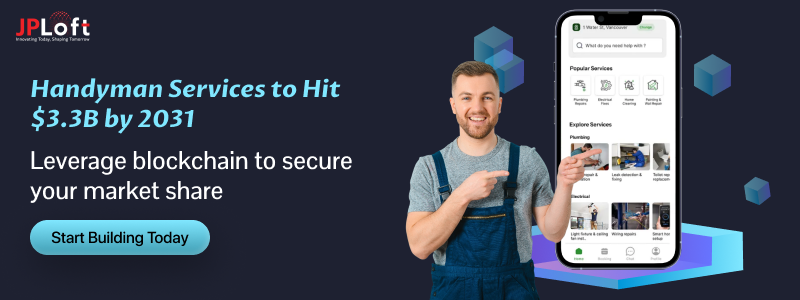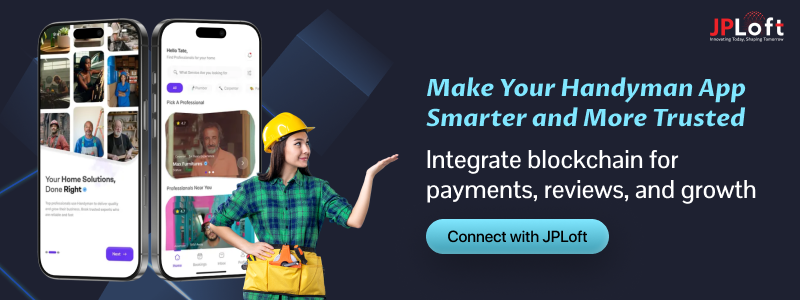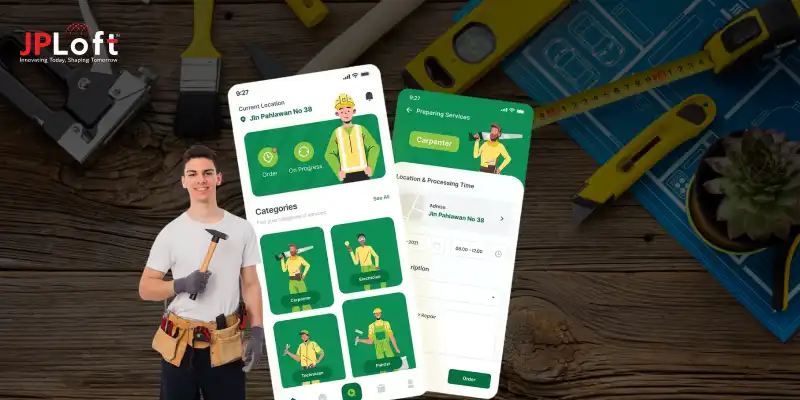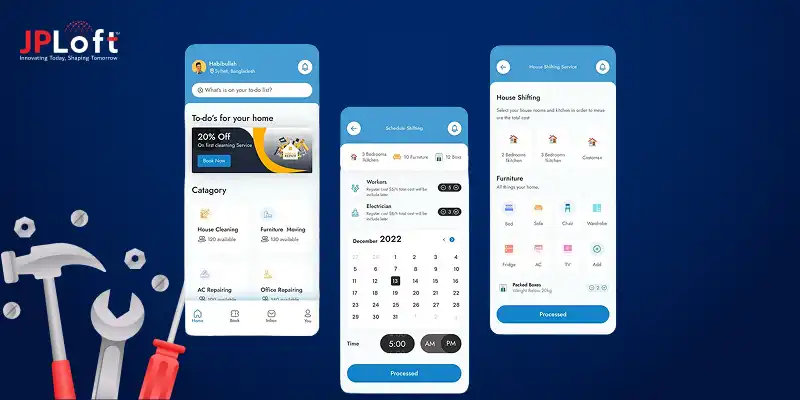Key Takeaways
Blockchain in handyman apps secures payments, prevents disputes, and builds trust between customers and service providers.
Tamper-proof reviews and verified identities boost transparency, ensuring credibility for professionals and confidence for users.
Smart contracts automate job agreements, releasing payments only after task completion and reducing conflicts.
Early blockchain adoption offers handyman platforms a competitive advantage, scalability, and investor trust.
Token-based loyalty programs drive repeat bookings and increase customer engagement.
JPLoft empowers businesses with blockchain-powered handyman solutions built for transparency, scalability, and growth.
“Trust is built with consistency.” – Lincoln Chafee
In the digital service economy, trust is the foundation of long-term success. Handyman apps have made it easier than ever for homeowners to connect with professionals, yet issues like payment disputes, fake reviews, and a lack of transparency still create friction.
So, what is blockchain in handyman apps? It is the use of decentralized ledger technology to bring transparency, security, and automation into every transaction between customers and service providers.
For entrepreneurs, this blog explains how blockchain can make handyman apps more reliable, competitive, and customer-friendly. For investors, it highlights how blockchain integration minimizes risks, improves scalability, and strengthens overall market confidence.
From secure payments and tamper-proof reviews to smart contracts and verified identities, you’ll learn how blockchain is shaping the future of handyman apps, and why this technology should be at the core of your next business decision.
Let’s begin it all together.
Growing Handyman App Market
Now, let’s explore the key handyman market statistics in the given points.
-
The global handyman market size in 2024 has achieved a valuation of USD 448.89 million, and by 2033, the valuation is anticipated to reach USD 1579.14 million.
-
Additionally, the global handyman service market is valued at USD 342 million in 2022, which is expected to grow at a CAGR of 13.4% during the forecast period.
-
The handyman services market size was valued at USD 165 billion in 2023, and is projected to reach USD 3.3 billion by 2031, growing at a 10% CAGR during the forecast period from 2024 to 2031.
-
Additionally, the global market size for the on-demand handyman apps was valued at approximately $4.1 billion in 2023 and is projected to reach around $12.2 billion by 2032.
Following the above handyman app stats, let’s proceed with the concept related to blockchain in the handyman apps.
What is Blockchain in the Handyman Apps?
Blockchain in handyman apps is the deployment of decentralized ledger technology to introduce trust, security, and transparency into on-demand platforms. In the past, handyman apps have suffered from issues such as payment disputes, forged reviews, the absence of service provider verification, and settlement delays.
Using blockchain reduces or eliminates these problems. Smart contracts can automate interactions between customers and service providers so that payments are only made after job completion. Each transaction, assessment, and certification is retained on an unalterable ledger, eradicating fraud and tampering.
Buyers become assured of confirmed service records, and providers enjoy quicker, safer payments. For businesses and investors, blockchain infuses a competitive advantage by making handyman apps more trustworthy, scalable, and future-proof within a market that increasingly requires accountability and digital trust.
Let’s learn more about the importance of blockchain integration in handyman apps in the section below.
Benefits of Integrating Blockchain in Handyman Apps
When you create a handyman app, one of the major parameters that you need to evaluate is the type of technologies to include in it. Along with the kind of benefits that your app will have after adopting these technologies.
In this section, let’s explore the diversified benefits of integrating blockchain in handyman apps.
1. Secure and Clear Payments
Blockchain in handyman apps allows for all payments to be made and recorded on an immutable ledger, eliminating the threat of chargebacks and disputes. Service providers receive quicker settlements, while customers have full confidence that their money is secure and safely transferred.
2. Prevention of Fraud and Building Trust
With blockchain, transactions, reviews, and ratings are tamper-proof. This completely dispenses with fake reviews and manipulation, and users can trust the platform and service providers to a larger extent. Trust becomes the anchor for long-term growth and user loyalty.
3. Automated Smart Contracts
Smart contracts are self-executing service contracts that are triggered on the fulfillment of conditions, i.e., only after the job is completed, release payments. This minimizes the need for intermediaries, decreases operational expenditures, and guarantees that both parties fulfill their obligations.
4. Identity and Credentials Verification
Blockchain in handyman apps offers credentials, licenses, and background checks to be securely and openly stored. Customers can simply check if a professional is genuine, increasing safety and credibility in the hiring process.
5. Dispute Resolution at Speed
With the traceable records of blockchain, disputes between customers and service providers are easily resolved. The ledger gives authentic evidence of transactions and agreements, ensuring resolution to be fair and impartial.
6. Competitive Advantage and Investor Trust
Incorporating blockchain in handyman apps offers a future-proof edge in an oversaturated market. Investors interpret it as signaling innovation, scalability, and minimized risks, making the platform more appealing for investment.
Following these benefits of blockchain in handyman apps, let’s proceed with the role of blockchain in handyman apps.
Role of Blockchain in Handyman App Development
Blockchain is reshaping handyman app development by adding transparency, trust, and efficiency to every transaction.
From secure payments to verified reviews and smart contracts, blockchain ensures accountability for both customers and service providers. By reducing fraud, automating agreements, and safeguarding data, it sets the foundation for more reliable and scalable handyman platforms.
1] Securing Digital Payments
Blockchain enables tamper-proof, transparent, and fast transactions between customers and service providers. By eliminating middlemen, payments can be settled instantly with reduced transaction fees. Thus, it improves the overall handyman app security and develops trust among the users.
This reduces the risk of fraud or non-payment while ensuring service providers receive their money without delays. For customers, it builds confidence that their funds are transferred securely and recorded on an immutable ledger.
2] Smart Contracts for Service Agreements
Smart contracts automate agreements between users and handymen. Payments are only released when predefined conditions are met, such as service completion and customer approval. This automation minimizes disputes, removes the need for third-party mediators, and ensures fair transactions. It also creates a streamlined workflow where both parties are accountable, leading to stronger trust in the platform.
3] Transparent Review and Rating System
Blockchain can record customer reviews and ratings permanently, making them tamper-proof. This reduces the occurrence of fake reviews and manipulations often seen in centralized systems.
Users can confidently rely on verified feedback, while skilled handymen are rewarded for genuine performance. Over time, this transparency helps build a reputation-driven ecosystem where credibility is clear and fair.
4] Verified Identity and Background Checks
Service providers’ credentials, licenses, and past work history can be securely stored on the blockchain. Customers can verify this information before hiring, ensuring they engage only with qualified professionals.
This feature also adds a protective layer for investors and platform owners, as verified workers improve overall service quality and reduce risks tied to fraudulent providers.
5] Dispute Resolution Made Easier
With every transaction and contract recorded on the blockchain, disputes can be quickly resolved. The ledger provides verifiable proof of agreements, payments, and job completion.
This reduces bias in conflict resolution and allows fair settlements without extended delays. For platforms, it reduces operational costs linked to handling complaints manually.
6] Loyalty Programs and Incentives
Blockchain can power token-based reward systems where customers earn tokens for repeat bookings or referrals.
These tokens can be redeemed for discounts, premium services, or traded within the ecosystem. For handymen, incentive tokens may be offered for consistent quality work. This adds a new revenue stream while boosting customer retention and platform engagement.
7] Enhanced Security and Data Privacy
Customer and provider information, including personal details and job history, can be secured on decentralized ledgers. Unlike centralized databases that are prone to hacks, blockchain makes data nearly impossible to tamper with. This provides stronger compliance with data protection regulations and assures users that their information is safe.
8] Building Investor Confidence
By integrating blockchain, handyman apps showcase innovation, security, and transparency, qualities that attract investors.
Investors are more likely to support platforms with reduced risks, improved governance, and strong growth potential. Blockchain signals that the platform is prepared for scalability, regulatory compliance, and long-term market competitiveness.
Following the above set of roles of Blockchain in handyman apps, let’s discuss the use cases in the proceeding section.
Use Cases of Blockchain in Handyman Apps
The top handyman apps that use blockchain technology can not be defined perfectly; however, here is a detailed view of the prospective usage of blockchain.
|
Platform |
Blockchain / Token Use Case |
How It Could Be (or is being) Applied |
Notes / Evidence |
|
TaskRabbit |
Crypto / token payments for gig workers |
Workers choose to accept payment partially or fully in cryptocurrency via smart contracts |
TaskRabbit has not officially launched crypto payments yet, but industry commentary notes that major freelance/gig apps are exploring it. |
|
Urban Company (UrbanClap) |
Credential verification/reputation on the ledger |
Store service provider licenses, certifications, and reputation scores on an immutable ledger so customers can verify credentials transparently |
No public documentation of this, but the model aligns with blockchain’s trust use cases |
|
Handy |
Smart contract-based bookings & conditional payments |
A handyman’s payment is locked in a smart contract and released when proof of task completion is submitted |
The idea is consistent with smart contract models in service platforms, though I saw no proof that Handy does this now |
|
Thumbtack |
Token/reward ecosystem & payments |
Issuing tokens as rewards or integrating blockchain for provider payments and loyalty incentives |
No public source states that Thumbtack is doing this presently; most references focus on their marketplace and lead generation models |
|
Angi (Angie’s List / HomeAdvisor) |
Immutable reviews and dispute resolution |
Reviews, past project history, and contractor credentials stored on chain to prevent manipulation; facilitate faster trust resolution |
Again, this is a conceptual use case; Angi currently operates as a more traditional platform |
How to Integrate Blockchain in Handyman Apps?
To start an online handyman business, you should know the current trends in technology. Blockchain is one of the present technologies to invest in.
Let’s check out the steps to integrate blockchain into handyman apps.
Step 1: Define the Use Cases and Success Metrics
Start by writing down where blockchain actually helps: identity verification, job-contract automation, escrow payments, dispute logs, and reviews that can’t be edited. Prioritize two or three to ship first. State simple KPIs like fewer payment disputes or faster payouts. This grounds the role of blockchain in handyman apps in real problems, not theory.
Step 2: Pick the Stack and Network
Choose a chain with low fees and good tooling, like Polygon or an L2 on Ethereum. Decide if you need public, private, or permissioned access based on compliance and data sensitivity. Map smart contracts, wallets, and an indexer to your current backend. This keeps the impact of blockchain in handyman apps measurable and affordable.
Step 3: Design the Smart Contract Layer
Create contracts for job posting, quoting, acceptance, and completion. While pursuing with handyman app design, add an escrow that locks funds until both sides confirm milestones. Include dispute resolution with clear paths and timeouts. Keep contracts upgradeable and write simple events for every state change so the app can stay in sync.
Step 4: Integrate Identity and Trust
Link KYC or business verification to on-chain identities using verifiable credentials or a reputation score. Store only hashes or references on-chain, while sensitive data stays off-chain. Show reputation in-app with badges and job history. This improves trust without exposing private data.
Step 5: Build the Payment Flow with Escrow
Let customers pay fiat or crypto, but always settle jobs through the escrow contract. Support milestone releases and partial refunds via contract functions. Use a reliable on-ramp/off-ramp for fiat users. Clear payout timelines reduce churn and make the role of blockchain in handyman apps tangible for both sides.
Step 6: Connect On-Chain Events to Your App
Run a lightweight indexer or use a service to listen to contract events. Update job status, balances, and dispute flags in real time. Show a simple “audit trail” screen in the app with timestamps. This is the day-to-day impact of blockchain in handyman apps that users actually see.
Step 7: Secure, Test, and Monitor
Get a basic audit, handyman app testing, or at least a peer review on contracts before mainnet. Fuzz test edge cases like canceled jobs, expired quotes, and disputes. Add monitoring for gas spikes and failed transactions and set alerts. Document rollback and upgrade paths to avoid downtime.
Considering the above steps, let’s move to the key challenges of integrating blockchain, factors that every investor should assess before partnering with an on-demand app development company.
Challenges Faced While Integrating Blockchain in Handyman Apps
The challenges in handyman app development can be vast, and if you consider implementing a new technology, as blockchain, the challenges can be multiplied.
Hence, for integrating blockchain, finding out what will work or not, can be effective. Here is the list of top challenges faced while integrating blockchain in handyman apps.
► Complicated Implementation and Expensive Development
Implementing blockchain in handyman apps needs experienced developers who are familiar with both blockchain protocols and mobile platforms. This increases development expenses over conventional apps. Small or medium-sized handyman platforms might struggle to put up the initial investment, particularly during early adoption.
► Scalability and Performance Issues
Blockchain transactions are sometimes slower than in centralized systems. When handyman apps have to process thousands of service requests, job updates, and payments at scale, delays in confirming transactions will impact user experience. Maintaining performance without relinquishing decentralization is the biggest barrier.
► Regulatory and Compliance Uncertainty
The application of blockchain in handyman apps overlaps with financial regulations, consumer rights, and data privacy legislation. There are various rules across different geographies, and this leaves app operators confused. This complicates the process of rolling out worldwide without fitting into several compliance frameworks.
► User Adoption and Education
For the majority of homeowners and service providers, blockchain technology remains a black box. Describing things like wallets, escrow contracts, or unchangeable reviews might intimidate users. Absent proper onboarding, the benefits of blockchain in handyman apps could remain solely with tech-loving customers.
► Security and Data Privacy Issues
Although transparency is offered within blockchain, storing sensitive information on-chain opens the data to risks. Hybrid models balancing privacy and transparency are needed, such that individual data remains off-chain. Our key challenge as developers is to build such systems without compromising trust and enhancing mobile app security
► Integration with Existing Payment Systems
Handyman apps will need to accommodate fiat payments in addition to crypto. Integrating blockchain escrow with traditional payment gateways introduces technical overhead. Users want frictionless payouts, and any payment friction can rapidly undermine adoption and faith in the platform.
With the API integration for the handyman app, blockchain escrow can seamlessly connect with existing payment gateways, ensuring users enjoy secure, instant, and hassle-free transactions.
Till now, as you have gone through the concept of blockchain, how it is helpful for handyman apps, its role, use cases, steps to integration, and a list of challenges.
Let’s check out the future trends in implementing blockchain technology in the following section.
Future Trends of Implementing Blockchain in Handyman Apps
The future of blockchain in handyman apps is poised to reshape how homeowners and service providers interact, bringing more trust, automation, and global scalability.
One of the most significant changes will be the widespread use of smart contracts, allowing job agreements, payments, and dispute resolution to happen automatically and transparently. Escrow-based payments will become the norm, ensuring both sides are protected until tasks are completed. Immutable reviews stored on blockchain will make fake ratings a thing of the past, helping reliable professionals stand out.
Decentralized identity verification will speed up onboarding and assure users of verified credentials. Token-based loyalty and incentive programs are also expected to keep customers engaged while rewarding service providers. As part of the current trends in handyman apps, blockchain will not only address trust and payment challenges but also build a more future-ready, scalable, and investor-friendly service ecosystem.
Connect with JPLoft and Build Your Blockchain-Integrated Handyman App
Blockchain is reshaping the on-demand service space, and handyman apps are no exception. From secure escrow payments to immutable reviews and transparent contracts, blockchain ensures trust and efficiency between service providers and customers.
If you’re looking to stay ahead in this evolving market, partnering with the right development team is crucial. JPLoft, a leading handyman app development company, specializes in building feature-rich platforms powered by blockchain technology.
Our expertise lies in creating apps that combine usability, scalability, and next-gen security features tailored to your business needs. By integrating blockchain, we help you deliver greater transparency, faster payments, and long-term customer loyalty. Whether you’re a startup or an established service platform, JPLoft offers the right mix of innovation and reliability to bring your vision to life. Connect with us today and transform your handyman app into a future-ready solution.
Conclusion
Blockchain has the power to transform handyman apps by addressing long-standing issues like payment disputes, fake reviews, and trust gaps between customers and service providers. With features such as secure escrow payments, immutable reviews, and decentralized identity verification, handyman apps can evolve into transparent, efficient, and future-ready platforms. For businesses and investors, integrating blockchain isn’t just about adopting a new technology-it’s about creating a competitive advantage in a market that’s growing rapidly. The future belongs to handyman platforms that combine convenience with trust, scalability, and innovation, and blockchain makes that possible.
FAQs
Blockchain ensures transparency, security, and efficiency. It eliminates fake reviews, reduces fraud, and enables faster and safer payments through smart contracts and escrow.
Smart contracts automate agreements between clients and service providers. Payments are released only after task completion, ensuring fairness and minimizing disputes.
Yes. Immutable reviews, verified credentials, and tamper-proof records give customers confidence, while service providers build long-term credibility and stronger client relationships.
While initial costs may be higher than traditional development, blockchain reduces operational risks, improves efficiency, and boosts investor confidence, offering strong long-term ROI.
Some key challenges include scalability, regulatory compliance, user adoption, and integrating blockchain with existing payment systems. Overcoming these requires skilled development and strategic planning.
Future apps will use blockchain for secure payments, identity verification, IoT-powered maintenance requests, and token-based rewards, making platforms more transparent and globally scalable.













Share this blog